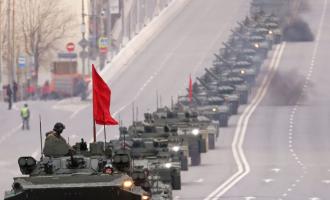"No instructor involved in training Ukrainian soldiers is immune" from being hit, Kremlin spokesman Dmitry Peskov told reporters today. "It doesn't matter whether they are French or not," he added. Russian President Vladimir Putin had said on May 28 that the trainers were "already there", namely in Ukraine, "under the guise of mercenaries".
by Maria Denaxa for the newsbreak.gr
At the end of May, the Europeans discussed a plan for a European coalition of military trainers to train Ukrainian troops in Ukraine. Macron, in an interview with French television on Thursday, is expected to announce the deployment of French military trainers to Ukraine.
The aim of this initiative is to improve efficiency and provide training directly on Ukrainian soil in mine clearance or maintenance of military equipment sent to Kiev, according to a diplomatic source.
However, millions of citizens of European countries fear the consequences of Moscow. But their concern is not being taken into account by the local European leaderships.
Λίγες ημέρες πριν από τις ευρωεκλογές, ο Εμανουέλ Μακρόν αποφάσισε να δώσει μια συνέντευξη εφ’ όλης της ύλης στη γαλλική τηλεόραση, όπου αναμένεται να ανακοινώσει περαιτέρω εμπλοκή της Γαλλίας στην Ουκρανία με την αποστολή Γάλλων εκπαιδευτών.
- by Maria Denaxa
However, the news coming from the Ukrainian front is not good. On Sunday evening, it was reported by Asian media that the Russians had struck a NATO bunker, where 179 Europeans and Americans, including trainers, technicians and fighter pilots, died, and 201 other Westerners were wounded.
At the same time, French authorities are investigating who is behind the placement of five coffins covered with the French flag in the area of the Eiffel Tower and the inscription "French soldiers killed in Ukraine".
Reports citing sources close to the investigation say the coffins are a message from Russia to the French president about his plans to send French "trainers" to Ukraine.
However, with his busy schedule in the coming days, due to the 80th anniversary celebrations of the invasion, welcoming Zelensky, Biden and other leaders to France, Emmanuel Macron is expected to occupy much of the news coverage. Political analysts believe he will use the historic D-Day event to escalate Europe's confrontation with Russia.
With his announcement that French soldiers will be deployed in Ukraine, under the pretext of "training missions", he will essentially announce the first step of a broader strategy, which will provide for a more direct military involvement of European and NATO forces in the region.
This move will mark a shift from indirect support to active participation in the conflict, which many believe could lead to an all-out war between Europe and Russia.
For the Kremlin, the involvement of French soldiers and possibly other NATO forces will mark a significant change in the dynamics of the conflict and thus a direct challenge, to which the Russian leadership has repeatedly warned that it will respond.
On the other hand, Zelensky's invitation to the D-Day commemorations raises questions about the authority and legitimacy of his actions, as his term of office expired on 21 May.
Nevertheless, the presence of the President of Ukraine at the events and his discussions with Macron and other leaders show that the West continues to support his leadership and the Ukrainian cause.
By choosing June 6 to announce the deployment of French troops to Ukraine, Macron is drawing parallels between the current conflict and the decisive actions taken during World War II.
It is a call to action for European nations to unite against a common threat. The symbolism of D-Day, a moment of unity and determination, is intended to mobilise support for a collective European response to so-called Russian aggression.
Many fear that Macron's announcement will only be the beginning. The involvement of European and NATO forces in Ukraine is then expected to increase, leading to a possible full-scale conflict with Russia. Every move by the West will be closely watched as an indicator of how far the escalation will go.
Unfortunately, our world is on the brink of a major confrontation and the decisions made in the coming days and weeks are likely to have far-reaching consequences for all of us.
The consequences of this escalation could extend beyond Europe. The involvement of NATO forces in Ukraine is likely to provoke a strong response from Russia and this could lead to retaliation in other regions.
If someone does not take a peace initiative, even at the last minute, then there is no doubt that global prosperity is at stake. Countries around the world are preparing for the possible consequences of a war that could have a devastating impact on global stability and security.




